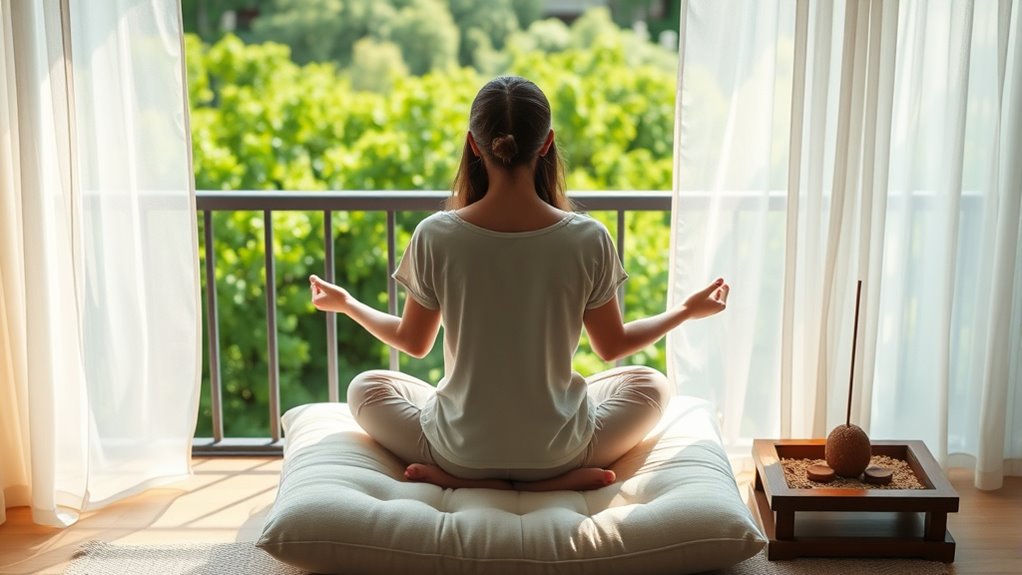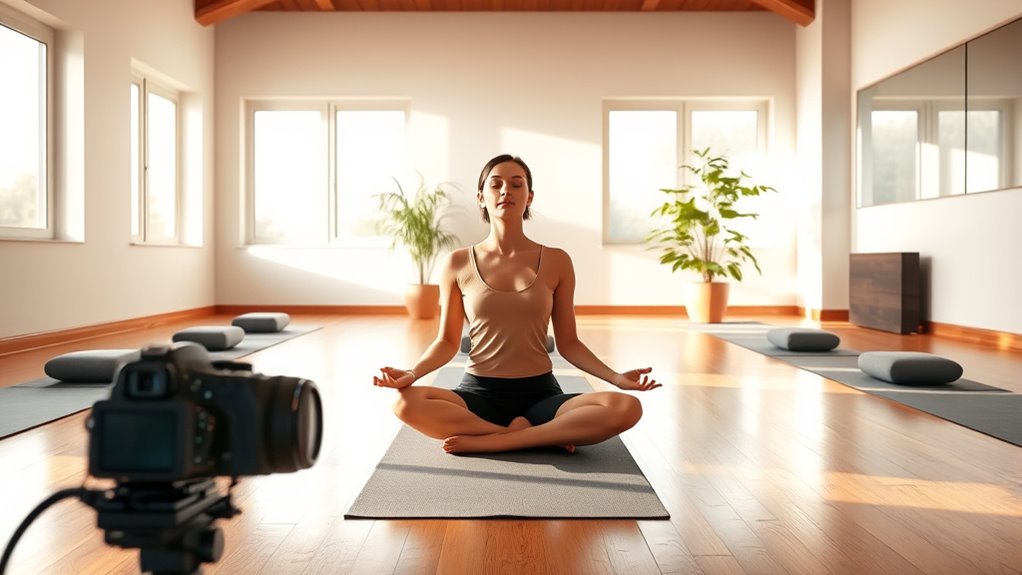Many professionals overlook simple yet powerful stress reduction habits like mindfulness, regular movement, and quality sleep, even though these tools help maintain resilience and focus. Incorporate quick mindfulness exercises during busy moments, stretch or walk to boost mood, and establish relaxing routines at night. Small consistent actions make a big difference over time. Keep exploring how these effective habits can transform your stress management approach for better emotional balance and well-being.
Key Takeaways
- Incorporate daily mindfulness practices like focused breathing and mindful eating to manage stress proactively.
- Ensure regular movement through stretching, walking, or ergonomic adjustments to prevent physical tension.
- Establish consistent sleep routines with calming environments and nightly journaling to support emotional stability.
- Use relaxation techniques such as aromatherapy and wind-down routines to signal your body to relax.
- Leverage personalized self-care tools and habits to maintain resilience and prevent overlooked stress buildup.
Incorporating Mindfulness and Meditation Into Daily Life

Practicing mindfulness and meditation can considerably reduce stress when integrated into your daily routine. Start by incorporating simple breathing exercises, like deep inhales and slow exhales, to calm your mind during busy moments. These exercises help you stay present and manage anxiety effectively. Additionally, mindful eating encourages you to focus on your food, savor each bite, and notice sensations such as taste, texture, and smell. This practice diverts your attention from stressors and grounds you in the present. Even just a few minutes daily of focused breathing or mindful eating can make a significant difference in your stress levels. Incorporating mindfulness techniques into your routine can further enhance your emotional stability and overall well-being. Consistency is key—over time, these habits become natural tools to help you stay centered and reduce daily tension.
Prioritizing Physical Activity and Movement

Engaging in regular physical activity is one of the most effective ways to reduce stress and boost overall well-being. Incorporate stretching routines into your day to loosen tight muscles and release built-up tension, making movement more comfortable and relieving stress. Additionally, ergonomic adjustments to your workspace can prevent strain and promote better posture, reducing physical discomfort that contributes to stress. Make it a habit to stand up and stretch every hour, especially if you sit for long periods. Simple activities like walking or light exercises can elevate your mood and clear your mind. Prioritizing movement not only benefits your body but also helps you stay mentally resilient, making stress easier to manage throughout your day. Incorporating electric bikes into your routine can also encourage more outdoor activity and help reduce stress.
Establishing Consistent Sleep and Relaxation Routines

To effectively reduce stress, establishing a consistent sleep and relaxation routine is essential. You can start by incorporating journaling practices each night to clear your mind before bed, helping you unwind and reflect. Creating a calming environment with aromatherapy techniques, like using lavender or chamomile essential oils, can promote relaxation. Consistency is key—try to go to bed and wake up at the same time daily, even on weekends. Establish a wind-down routine that signals your body it’s time to relax, such as dimming lights, stretching, or listening to soothing music. Additionally, integrating email marketing tool integration into your routine can help you tailor your self-care messages and reminders, making your habits more engaging and personalized. These habits help regulate your sleep cycle and reduce stress levels, making it easier to face daily challenges with a calmer mindset.
Frequently Asked Questions
How Quickly Can Stress Reduction Habits Improve Mental Health?
You can start noticing improvements in your mental health within days of practicing stress reduction habits like mindfulness meditation and breathing exercises. These techniques help lower your cortisol levels and improve emotional resilience quickly. Consistent daily practice boosts your mood, reduces anxiety, and enhances focus over time. While some benefits are immediate, sustained effort is key to long-term mental health improvements, making these habits valuable tools for managing stress effectively.
Are There Specific Foods That Help Reduce Stress Effectively?
Yes, certain foods like superfoods and calming teas can help reduce stress effectively. Incorporate superfoods such as berries, walnuts, and dark chocolate into your diet, as they’re rich in antioxidants and magnesium that promote relaxation. Drinking calming teas like chamomile or lavender tea can soothe your mind and body. Combining these foods with balanced meals can enhance your stress management and improve your overall mental well-being.
Can Hobbies Serve as Effective Stress Management Tools?
Imagine a busy street suddenly calming as you embrace your hobbies—hobbies serve as effective stress management tools by providing a peaceful escape. Engaging in activities like mindfulness meditation or hobby therapy helps you disconnect, relax, and refocus. When you dedicate time to these passions, you create mental space to recharge, reducing stress and boosting overall well-being. Your hobbies become your sanctuary amid life’s chaos.
How Do Workplace Habits Influence Overall Stress Levels?
Workplace habits considerably impact your overall stress levels. Poor workplace communication can lead to misunderstandings, frustration, and tension, while a chaotic office environment may increase anxiety. By fostering open, respectful communication and maintaining a clean, organized office, you create a calmer atmosphere. These habits help reduce stress, boost productivity, and improve your well-being, making your workday smoother and more manageable.
What Are Signs I’M Overusing Stress Reduction Techniques?
Like a knight stuck in a never-ending quest, you might notice signs of mindfulness overload, such as feeling numb or detached, and relaxation fatigue, where even calming activities feel draining. If you find yourself obsessively seeking stress relief, it’s a sign you’re overusing techniques. These signs indicate your mind and body need balance, not just more calming strategies. Take a step back, and consider diversifying your approach for better well-being.
Conclusion
Remember, taking care of your mental health isn’t a luxury—it’s essential. By weaving mindfulness, movement, and proper rest into your daily routine, you’re building a foundation that can weather life’s storms. Think of it like tending a garden—you water and nurture it regularly, and it flourishes. Don’t overlook these simple habits; they’re your tools for reducing stress and cultivating peace. Start today, and watch your well-being blossom.










